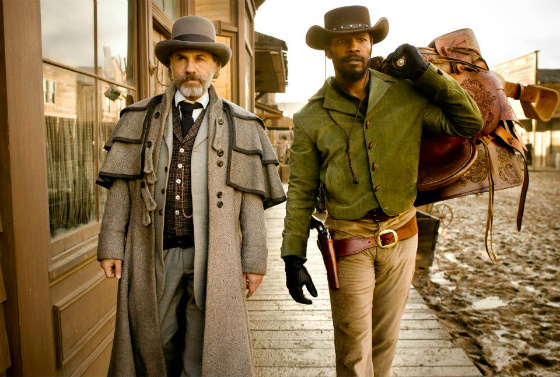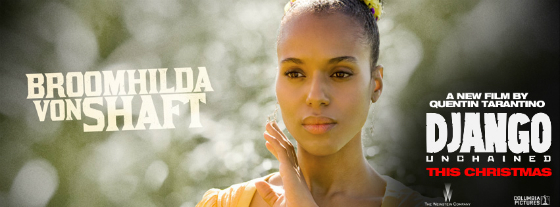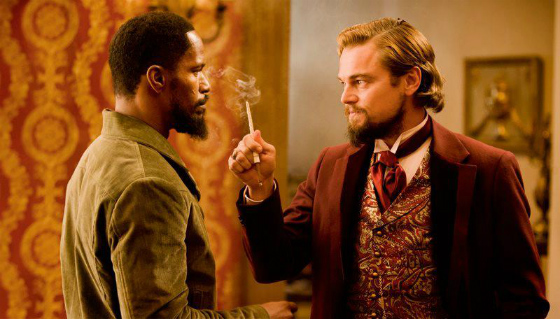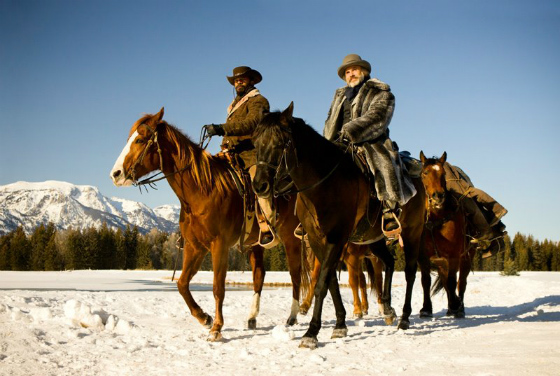Fanboy Flick Pick: Django Unchained Could Use A Bit More Restraint
(A new recurring feature, in which I review an upcoming or just-released genre movie of interest.)
 |
| Weinstein Company |
Here’s a question: why is it assumed that Django Unchained is a foregone conclusion when it comes to awards nominations, and yet Grindhouse was not?
Okay, yeah, “Robert Rodriguez.” I get that. But let’s do a thought experiment and imagine Quentin Tarantino had directed the whole thing, because really, it’s not so far outside the realm of possibility, and frankly, it’s flattering him, since his section of Grindhouse was the least interesting, in all (Edgar Wright’s “Don’t” trailer, which nobody seems to talk about any more, was the best). Here’s my point: a juiced-up, loving-yet-semi-ironic, postmodern recreation of horror movies doesn’t cut it…and yet a juiced-up, loving-yet-semi-ironic, postmodern recreation of spaghetti westerns and blaxploitation somehow does.
Don’t read this as a total dis, now: make no mistake, as a fun-filled tribute to those older, cheesier genres, Django Unchained absolutely works, and aside from being overlong is a pleasure to view. But it isn’t more than that; any lasting resonance it has derives primarily from its ability to evoke other, more resonant movies.
And yes, I would nominate Grindhouse for an Oscar first, if I had that power (I’d also nominate John Carter, which may make my judgment suspect. But that’s your call).
Aside from the profession of bounty hunting in the old west and a cameo by Franco Nero, Django Unchained has little to do with the original Django, itself the basis for Rodriguez’ El Mariachi and Desperado (if this is starting to sound like an incestuous circle to you by now, you’re not alone; the undeniably talented Tarantino often gets just this close to disappearing up his own behind. It’s starting to seem like great prescience that namesake Jango Fett spawned an army of clones). The new Django (Jamie Foxx) is a slave – and, in Tarantino’s mind, the literal ancestor of John Shaft (yes, really) – who is freed by an alleged dentist named Dr. King Schultz (Christoph Waltz), actually a bounty hunter in disguise. He’s tracking down some brothers who are former tormenters of Django’s; not knowing what they look like, Schultz takes on Django for a partner to hunt them down, in exchange for which he will help find Django’s wife, Broomhilda von Shaft (see, I warned you!), who is played by Kerry Washington.
 |
| Weinstein Company |
Waltz proved in Inglourious Basterds that he’s an actor as perfectly suited to Tarantino’s beating-around-the-bush dialogue as Samuel L. Jackson used to be (more on him in a moment), and there’s plenty of it here for his tongue to relish. The polar opposite of so many taciturn, classic cowboys with guns, here is a guy who can’t simply tell you upfront he’s a duly deputized bounty hunter – he has to extract a lengthy promise that he won’t be shot, encourage any potential shooter to slowly approach and remove a letter from his pocket, then explain very precisely what the contents of that letter are even as the relevant individual is already reading it. Depending upon your temperament, this is a great recipe for either humor or frustration – I tend towards both simultaneously, but I imagine my mother walking out, or more likely, changing the channel she will one day accidentally happen upon. When we finally get to plantation owner Calvin Candie (Leonardo DiCaprio), who’s jes’ a slow’-talkin’ Suthanah, an’ he gits to jawin’, QT-style, well…what’s your tolerance for belaboring a joke? You know, the kind of repetition that’s annoying at first but then becomes hilarious in its annoyingness? I’m wracking my brains for a single word to describe that sensation, but coming up blank. So let’s make one up: Repeti-larious! Many colleagues of mine were not so amused, but I have to say it’s nice to see DiCaprio actually enjoying a role for once, rather than visibly straining his acting muscles to look constantly upset, and before that, Don Johnson doing basically the same thing.
 |
| Andrew Cooper/Weinstein Company |
So then we get to the question of Jamie Foxx. I’ve run the gamut on him in the past, from irritation (those Wanda skits on In Living Color) to enjoyment (Any Given Sunday). Here, he’s asked to play mutliple levels in a hyper-real fictional past – to infiltrate Candie’s “Candyland” and get back his wife, he must pretend to be a ruthless, racist promoter of black-on-black human cockfights – and he just feels a little lost. Perhaps Tarantino wouldn’t allow him to relish the role the way so many others in the cast clearly savor theirs, but I couldn’t help wondering what Terry Crews could have done in the part.
Then there’s Samuel L. Jackson as Stephen, the Uncle Tom-like house slave of Candyland. The question here is: can we blame him for playing a nasty, shucking and jiving stereotype if that’s exactly what the part called for? Perhaps we should ask Ahmed Best that question. Yes, there undoubtedly were real people like this – but never once do we get a glimpse of the self-loathing and the pain that would have to go into becoming such an obsequious toady for someone who suppresses your people. Long after he has to pay lip service, Stephen is so deep into the role that it never feels like a facade. Maybe it ought not to, but a glimpse of tension would have gone a long way.
 |
| Andrew Cooper/Weinstein Company |
SPOILER, MAYBE: It might also have added resonance to the third act, in which, after every other interesting character is no longer a factor, Django comes for Stephen, past the point where you may have said to yourself, “There’s still a whole ‘nother act to this movie?” Yep, it be long.
By the time you get to the gunfight version of Kill Bill‘s House of Blue Leaves sequence, with bullets generating absurdly gushing fountains of red, and well after you’ve seen Foxx do a nude scene with a ridiculously huge prosthetic penis, you’ll be ready for things to end. It’s not a movie anyone ought regret seeing, but it tries the patience more than it should.
Django Unchained opens Christmas Day.
